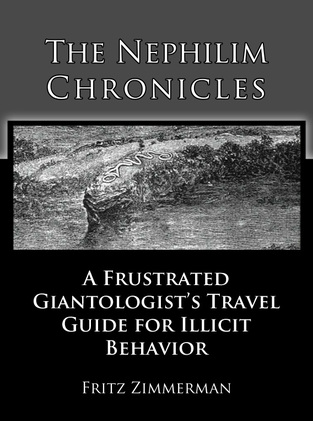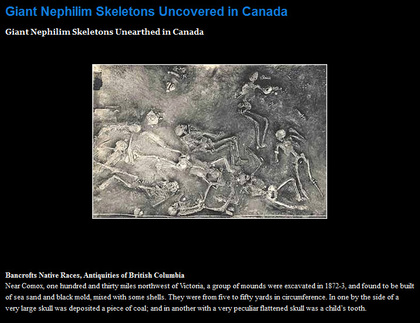
Sometimes, though, it becomes pretty clear pretty quickly.
Fritz Zimmerman, author of The Nephilim Chronicles and self-proclaimed "antiquities preservationist," has decided that the professional archaeological community is keeping the world from seeing whatever "truth" he is attempting to uncover. One of his remedies is to publish a book that he markets by saying it reveals the locations of sensitive archaeological sites that professional archaeologists don't want you to know about. (One of his webpages, for example, states "There is one burial mound at the park, but the DNR won't tell you where it is....but I will" next to the ad for his book - sounds like a pretty serious scholar, right?). He has found a sympathetic ear in treasure hunter J. Hutton Pulitzer, author of numerous books that purport to share "SECRETS and TECHNIQUES that make it possible for people to find lost history and treasure." If you don't see the irony here, you've probably already stopped reading.
In a recent exchange I had with Zimmerman on Facebook, he stated that
"It won't be long before the American people discover that university archaeologists are little more than a criminal organization based on outdated theories, deception and lies."
Now, as a professional archaeologist, that hurts my feelings. I've been doing archaeology now for about twenty years, and I don't recall ever sitting down with a cabal of other archaeologists and plotting about how we were going to suppress the truth with our outdated theories, deception, and lies. We discuss our outdated theories all the time, of course, and that discussion sometimes involves beer. In those cases, the lies and deception we perpetrate are aimed at each other rather than the American people at large. Sometimes bailing on the group before the check arrives is involved, but that's about as egregious as the misbehavior gets.
Zimmerman's statement about the criminality of academic archaeology came after I commented on a Facebook post by Pulitzer. Pulitzer had reposted the 2012 story of Jim Vieira's talk being removed from TEDx with the proclamation "SOMETHING HAS TO BE DONE: This is how the academia are suppressing our Hidden History. This is a sad sad sad state of affairs." Pulitzer, fresh off his TV appearances on The Curse of Oak Island, has been trying to drum up enthusiasm for his exploits by doing a series of audio interviews that he says showcase the "raging debate" about prehistory centered around "the Copper Culture" (I wrote about one of those interviews here; I have not listened to most of them). He says he wants to explore "all sides" of whatever this raging debate is supposedly about (I still haven't figured that part out, as he seems to throw everything including the kitchen sink into the "Copper Culture"), but if you pay attention it's pretty obvious that objectivity isn't really part of the equation. When I saw all the capital letters in his post about the suppression of Jim Vieira, I thought maybe World War III had broken out. And you know it's serious when you use "sad" three times in a row. Anyway, I basically told Pulitzer he was being silly and it was no wonder he had a hard time finding professional archaeologists to interview (he had invited me previously but I had declined). That brought out some giant enthusiasts, and we were off and running with the "but there's thousands of accounts" argument (again), and then Zimmerman, apparently also feeling suppressed, piped up with his commentary.
In addition to the obvious practical love affair one might expect between a person who wants to sell site locations and a person who writes books about how to find buried treasure, Zimmerman and Pulitzer share the common bond of not understanding how science works. That emerges clearly in this interview when they discuss their disdain for academic archaeology (about 13:00 in):
Pulitzer: "What they're talking about in peer review is ten guys just like themselves, who have the same exact degrees, who have the same exact theory. You write all your paper out, you present it to your peers to review. Well, if you do anything that is against the system, anything which is against the status quo, anything against what those degrees taught you it was, not only do they edit it, but in most times you have self-identified yourself as a rebel. And what happens is you get run out of town, you don't get your tenure, you're made into a laughing stock. So peer review is not to assure quality, as much as I believe peer review is actually to hide the smoking guns. And if you are so adamant about coming out about hidden history and forbidden truth, you're actually committing professional suicide if you're willing to talk about it. Do you agree, Fritz?"
Zimmerman: "Absolutely. You know, I liken it to the 15th and 16th century Church and it is why we are in the Dark Ages of history in North America."
According to these two (and many others who believe in giants, alien encounters with the ancient world, unicorns, a flat Earth, Bigfoot, etc.), there is some kind of "truth" out there, known but hidden by scientists, waiting to be revealed by someone courageous enough to do it: it's up to those outside of academia to really figure out what's going on and to somehow work around these obstacles that science has erected in their path. To heighten the drama of this particular battle in the war with the academic elites, the description of the interview loudly announces the existence of SECRET ARCHIVES that hold the "historic smoking guns." As best I can tell, those secret archives are the county history section of the Allen County Public Library where Zimmerman did his research (it is clear from the interview that Pulitzer does not really even know what county histories are - here's a description). Apparently there's a Dunkin' Donuts inside the library now, which is new since I lived in Fort Wayne.
Anyway, this conspiracy of academic archaeologists to suppress the truth comes as news to me, as does Pulitzer's revelation about how peer review actually works. Maybe the other scientists are shutting me out because I let my secret society membership dues lapse.
Zimmerman and Pulitzer aren't the only ones frustrated with science. But they're frustrated for the wrong reasons. As a scientist, I can tell you that there is a human component to all scientific work. Science isn't perfectly efficient. Sometimes it takes longer than it should, for example, for an incorrect idea to be discarded because egos, personalities, or institutional inertia get in the way. But incorrect ideas are eventually discarded, not arbitrarily but because they can be shown to be incorrect. The ability to falsify something (to show that it's wrong) is central to how science works: that's what lets us sort the plausible ideas from the implausible ones; that's what makes science cumulative; that's why we know more about the way the world works today than we did several hundred years ago. And despite what Zimmerman says, we know vastly more about prehistory now than we did a century ago. Watching ideas being proven wrong is watching science in action: it's a demonstration that science works, not evidence that it doesn't. In the classes I teach, I tell my students that each of them could probably outscore Aristotle on a basic quiz about the natural world covering physics, biology, chemistry, astronomy . . . That doesn't mean they're smarter than Aristotle, it just means they have the benefit of 500 years of scientific inquiry that he did not have. There has been an amazing increase in our knowledge that didn't come about by scientists conspiring to hide "the truth."
And there's no doubt that today's peer-review process isn't perfect and could use some fixing (here's an article in The Economist discussing that issue; here's another in Slate). But the imperfections in how science is done are not the reasons why Zimmerman's ideas are not accepted (or even entertained) by mainstream science. Speaking for myself, I can give you two better reasons.
 A screenshot from one of Zimmerman's websites, were he posts a photo of skeletons from Mohenjo-daro (in India) with a story about "giant skeletons" from Canada (which is not in India).
A screenshot from one of Zimmerman's websites, were he posts a photo of skeletons from Mohenjo-daro (in India) with a story about "giant skeletons" from Canada (which is not in India). The second reason is more serious than sloppiness. In the audio interview (starting about 16:00 in), Zimmerman and Pulitzer spend time agreeing with one another that the government's attempts to protect information about the locations of earthworks (and other sensitive archaeological sites which contain human remains and artifacts that are prized by looters because of their monetary value) are a bad thing. Gee, imagine that: a treasure hunter and a fringe theorist coming together to support the endangerment of irreplaceable cultural resources and burial grounds for their own immediate monetary gain. Shocking.
Why won't government officials let Fritz Zimmerman into their site files? That's easy: because it is part of their jobs, by law, to manage and protect information about the locations of archaeological sites that may be harmed if their locations were publicly known. While you listen to Zimmerman and Pulitzer's forbidden history conspiracy tantrum, you should familiarize yourself with Section 304 of the National Historic Preservation Act of 1966. That section reads as follows (bold added):
(a) Authority to Withhold from Disclosure.-The head of a Federal agency or other public official receiving grant assistance pursuant to this Act, after consultation with the Secretary, shall withhold from disclosure to the public, information about the location, character, or ownership of a historic resource if the Secretary and the agency determine that disclosure may-
(1) cause a significant invasion of privacy;
(2) risk harm to the historic resource; or
(3) impede the use of a traditional religious site by practitioners.
(b) Access Determination.-When the head of a Federal agency or other public official has determined that information should be withheld from the public pursuant to subsection (a), the Secretary, in consultation with such Federal agency head or official, shall determine who may have access to the information for the purpose of carrying out this Act.
Records of archaeological site locations maintained by state and federal governments are not public records in the same sense as marriage licenses kept at the courthouse. No-one, neither me nor an "antiquities preservationist" such as Fritz Zimmerman, can walk into a State Archaeologist's office and get access to the site files for no good reason. In fact, archaeological site locations are specifically exempt from the Freedom of Information Act under 16 U.S.C. § 470hh.
The rationale in limiting access to archaeological site records is simple and has nothing to do with concealing a "hidden truth:" it lessens the potential that sites will be looted by people illicitly seeking artifacts or other remains for monetary gain (e.g., treasure hunters). Zimmerman knows that the goal of not putting site locations into the public domain is to protect them from looting, but seems more concerned with positioning himself as someone who is pulling the veil from the "hidden history" that those of us in the professional community are trying to suppress. His goal is to sell books and to sell himself as a liberator. As is obvious from some of his material online, he understands that his willingness to disclose site locations is probably the biggest selling point of his books ("the DNR won't tell you where it is....but I will"). Are those books aimed at serious students of prehistory, do you think? Is this a person whose ideas anyone should take seriously? If he's accusing professional archaeologists of conspiring to keep him from facilitating the pillaging of archaeological sites for things to sell on eBay, I'm on board with being part of that conspiracy. Count me in.
I'm constantly evaluating and re-evaluating my best strategies for engaging with all kinds of people and ideas online. It's been a learning experience. As far as the dynamic duo of Zimmerman and Pulitzer . . . I think I've seen enough. As I mentioned above, Pulitzer has invited me to be interviewed (and to repost one of my blog posts on his site) and I have declined. I know that by doing that I'm losing out on an opportunity to communicate to a different audience than those who read my blog. But I also know that my refusal means I'm not participating in creating content that is designed to draw people to a website that promotes treasure hunting under the guise of "truth." Everything I've seen from Pulitzer so far leads me to believe that joining him in the "debate" and "search for truth" would be a game of charades. He is running a bush-league circus of disinformation. So . . . thanks, but I'm going to pass on this one.
PS: To my archaeology friends in the Midwest (especially Indiana and Ohio): please be aware of Zimmerman's activities. I do not believe he is acting responsibly and I do not believe he has the best interests of the resources at heart. I was a bit conflicted about writing this post because I didn't want to bring any additional attention to his books, but after thinking about it I concluded that anyone who is interested in using his books for illicit and/or unethical activities probably already knows about them. Conversely, I'm guessing that many professional archaeologists in the Midwest were not aware of Zimmerman and Pulitzer. So now you are. I hope some good comes of that.


 RSS Feed
RSS Feed
